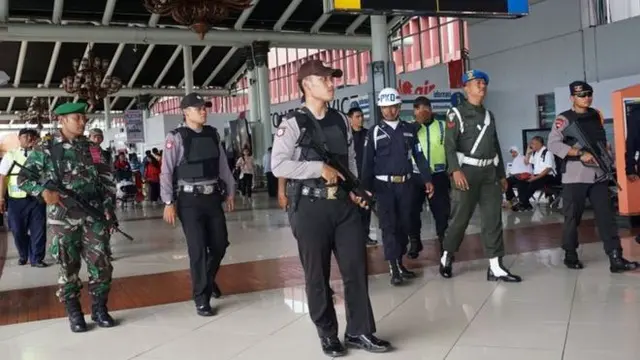Basuki Tjahja Purnama, a Christian, is the first ethnic Chinese to hold the governor's post in the capital of majority Muslim Indonesia.
Protesters gathered at the Istiqlal Mosque and are heading towards the presidential palace.
Police are bracing for the possibility of religious and racial tensions.
In 1998, a wave of anti-Chinese sentiment led to mobs looting and burning Chinese-owned shops and houses. Ethnic Chinese make up about 1% of Indonesia's population of 250 million people.
Chief of Jakarta police Insp Gen Mochamad Iriawan told the BBC female officers in hijabs would be deployed on the front line of the protest "as a humanistic approach".
"We also have male police officers who are experts in Islamic chanting and will sent them to the street if we need them [to calm the tension]," he said.
About 20,000 security personnel have been deployed for the protest.
What are protesters angry about?
Mr Purnama, know as "Ahok", is planning to run for a second term as governor in February 2017.
But some Islamic groups have already urged people not to vote for him, citing a verse from the Quran.
The verse is interpreted by some as prohibiting Muslims from living under the leadership of a non-Muslim. Others say the context for that verse is a time of war and it should therefore not be interpreted literally.
On 28 September, Mr Purnama, in comments that were filmed, said those using the passage - Surat Almaidah 51 - against him were "lying".
"Ladies and gentlemen, you don't have to vote for me because you've been lied to, with Surat Almaidah 51 and the like. That's your right," he said.
The comments caused outrage because they were seen as criticising a Quranic verse.
Mr Purnama has since apologised but formal complaints were lodged against him by Islamic groups for defamation. He is now being investigated by police.
Is it only about this incident?
There are other underlying tensions.
In 2014, Mr Purnama was the deputy governor under Joko Widodo. When Mr Widodo was elected president the main group behind the current protest - Islamic Defenders Front (FPI) - did not want Mr Purnama to succeed him.
They argued that a Christian should not govern a Muslim-majority city.
The campaign against him has since taken on anti-Chinese overtones.
Jakarta police said there were "provocative statements and images" on social media urging people to take violent action against Mr Purnama, including calls to kill him.
Some of the ethnic Chinese business owners in Jakarta were nervous ahead of the rally.
"We are worried that there will be small riots, that they are creating danger," Tommy, a TV store owner, told the BBC's Indonesian service.
"We are praying for the situation to be under control and safe," he said from Glodok - the part of Jakarta where many Chinese-owned electronics shops are concentrated.
During the 1998 riot, the area was badly damaged by looters, along with reports of incidents of mass rape.
Do all Indonesians feel this way?
Despite being seen as brash and outspoken, the governor is popular and has been praised by many for his effectiveness.
Muslims in Indonesia are largely moderate and the country's largest Islamic organisation, Nahdlatul Ulama, has advised its 40 million members not to take part in the protest.
FPI has a history of violent attacks on minorities and violent protests and has led the campaign against Mr Purnama from before the alleged blasphemy.
However, the day before the rally the group insisted it was not about him being a minority.
"This is not anti-Christian or anti-Chinese action," Habib Riziek, a spiritual leader for FPI said.
(BBC)
 简体中文
简体中文



